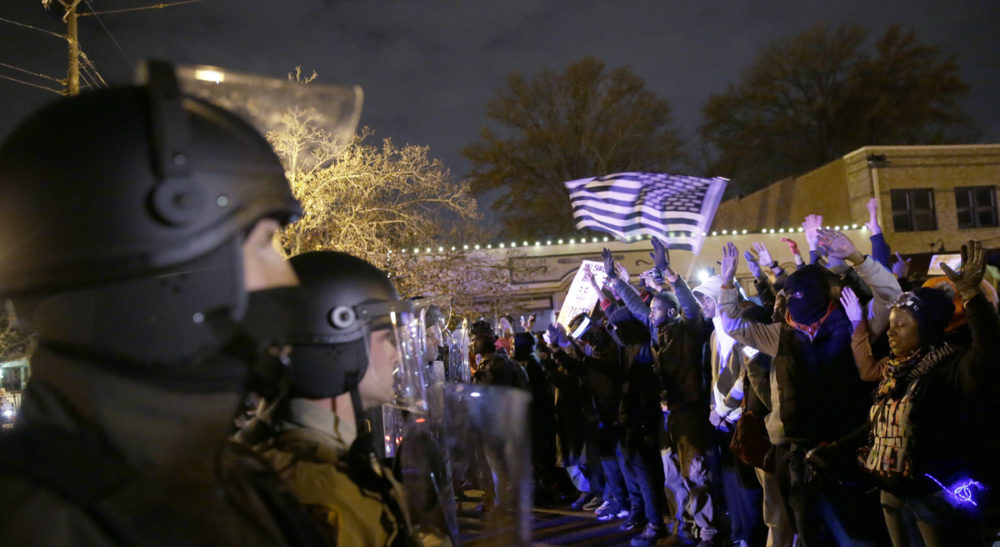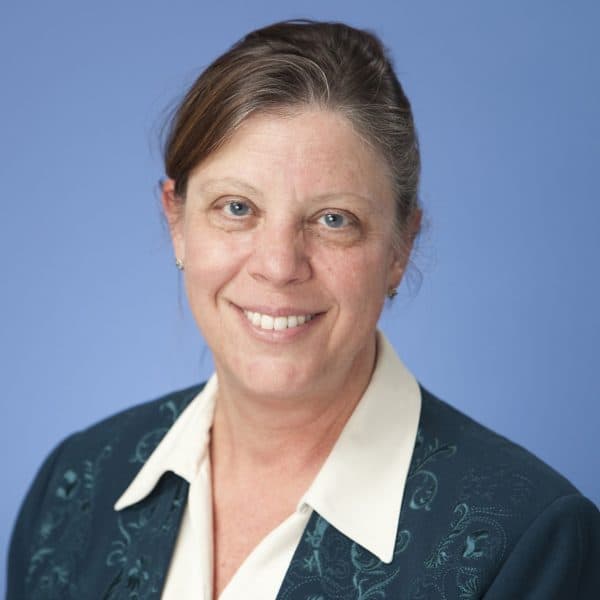Advertisement
Lessons Of Ferguson For Massachusetts

The anger, grief and disillusionment felt by many following the decision of a St. Louis grand jury not to issue an indictment against the Ferguson, Missouri, police officer who shot Michael Brown, an unarmed black man, has been met by public officials in Boston and nationwide with public calls for peace.
Calls for peace are understandable. Calls for calm are not.
The Boston Police Department, for example, issued public warnings to be on the lookout for “outside agitators.” Presumably, the BPD was unaware that the phrase “outside agitators” was made famous in 1964 by the segregationist governor of Alabama, George Wallace, to warn against the advocacy of Rev. Dr. Martin Luther King Jr. “Outside agitators” was also the term invoked by the infamous Birmingham Police Commissioner Eugene “Bull” Connor to justify turning dogs and fire hoses on black protesters seeking justice.
Similarly, households of students in the Boston Public Schools reportedly received robo-calls from the BPD this past Saturday, urging them to be peaceful following the grand jury’s decision in Ferguson.
Calls for peace are understandable. Calls for calm are not.
Of course, the BPD is right that we don't need more violence. But where was the letter acknowledging that the people of Boston, and all over this country, have not only a right but a reason to be upset about racial injustice? Where were the robo-calls to young people in Boston acknowledging the BPD’s own documented history of treating people of color differently from white people?
I believe that most law enforcement officers work with courage and respect for the communities that they are sworn to protect and serve. But we ignore at our peril the patterns of racial bias in police stop and frisk practices, as well as police use of excessive and sometimes fatal force without adequate investigation and accountability.
And if you don’t think what happened in Ferguson can happen here, think again. In many ways, it already has.
Do the names Malcolm Gracia, Mark Joseph McMullen or Denis Reynoso ring a bell? They should. Each of these Massachusetts men was recently killed by police officers. In each case, there was no independent investigation into the police shootings.
Malcolm Gracia, age 15, was fatally shot by two New Bedford police officers in 2012. The incident began with a stop and frisk, when officers stopped two teenage boys as they left a neighborhood basketball court. The encounter quickly escalated as officers surrounded the two boys. One officer reportedly grabbed Gracia, who reportedly then pulled a knife and stabbed the officer. Other officers fired two sets of three shots; the first set appears to have brought Gracia down to one knee, and the second set included a fatal shot to Gracia’s head.
The district attorney who investigated declared the shooting justified. But the DA’s report failed to justify the second, ultimately fatal, set of shots. It also failed to examine adequately the stop and frisk practices of the police, which lead to the confrontation in the first place.
The ACLU, NAACP and Lawyers Committee for Civil Rights called upon Attorney General Martha Coakley to conduct an inquest into Malcolm Gracia’s death. It never happened.
Mark Joseph McMullen, a 44-year-old black man, was shot by white Boston police officers in 2011. Again, the local DA declared the police shooting justified. Again, the ACLU, NAACP and Lawyers Committee for Civil Rights requested an inquest to restore public confidence. Again, there was no independent investigation. Instead, the Boston Police Department presented the Schroeder Brothers Memorial Medal — “the highest medal given . . . in recognition of bravery” — to the officers who fatally shot Mark McMullen.
Honoring police officers involved in fatal shootings seems to be a pattern. Just five days ago, Massachusetts Gov. Deval Patrick and the State Police awarded medals of bravery to three Lynn police officers who last year shot and killed Denis Reynoso, a veteran of the Iraq War who was reportedly suffering from PTSD when he was killed by police in 2013.
Beyond these shootings, consider the plight of tens of thousands of black Bostonians who are stopped, interrogated, frisked and searched by Boston Police Officers simply because of their race. Despite their stories — and a recent ACLU-issued report documenting racial bias in stop-and-frisk practices — the Boston Police Department has yet to announce a single policy change to address the problem.
We needn’t look to Ferguson to realize that racialized policing undermines public safety.
We needn’t look to Ferguson to realize that racialized policing undermines public safety. We should not wait for violent street protests to reform police practices in ways that would enhance both public trust and public safety.
We need only take an honest look at ourselves.
Of course, people of color and their allies in Boston, Ferguson, Birmingham and the rest of America don’t need “outside agitators” to stand up for their rights. They are doing it on their own.
But they shouldn’t have to. As the Rev. Dr. Martin Luther King, Jr., wrote in his “Letter from a Birmingham Jail,” we all have an equal obligation to stand up to racial injustice:
Whatever affects one directly, affects all indirectly. Never again can we afford to live with the narrow, provincial “outside agitator” idea. Anyone who lives inside the United States can never be considered an outsider anywhere within its bounds.
Perhaps that is the real lesson of Ferguson.
Related:
